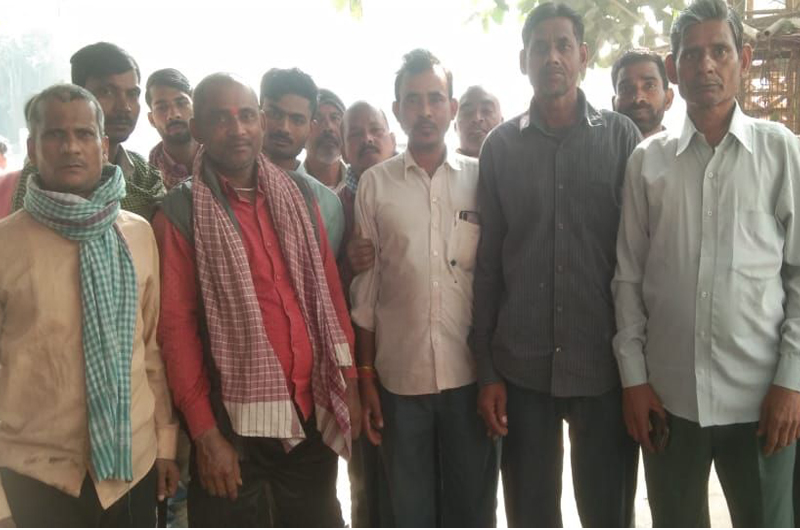With dwindling job opportunities and sub-par wages, even subsisting is a challenge for construction workers. All they can do is hope against hope. Bharat Dogra talks to some of those who wait at labour chowks in Delhi for their luck to turn
There seem to be no seekers for their services, but still, construction workers gather each morning at labour chowks with little or no amenities. It is around 10 in the morning, and the number of workers at the Sigalpur labour chowk in Shalimar Bagh area of Delhi is increasing. Munna, one of the workers, says, “The hope of getting any work is much less now due to the pollution-related ban on construction; but still workers assemble here in the hope of getting at least some minor repair work.”
This is just one of the numerous labour chowks in Delhi where workers gather every morning to offer themselves for daily wage employment. It is an indication of the desperation of workers that around 50 of them have gathered here despite low employment prospects. Even during ‘normal times’, they get only an average of 15 days’ work, earning around Rs. 7500 in a month, they say. It is not possible to survive on this one income in Delhi, so, more often than not, the women also work in the construction or industries sector or as domestic workers. Even so, a couple’s earnings rarely exceed Rs 13,000.
Most of the workers who gather here live in small, one-room tenements with a toilet shared by 20 to 30 people. The rent is between Rs 3000 and Rs 3,500, apart from electricity charges. Shockingly, only 10 per cent of the workers assembled here get subsidised or free grain on ration cards. Most of them have migrated from eastern UP or other areas and don’t have ration cards in Delhi. They say the scheme allowing them to get ration on their village ration cards has not been implemented, at least as far as they are concerned, and so they’re compelled to purchase foodgrains at the market rate.
“Just ask those assembled here how many have had a cup of tea before coming here, and you’ll see how small that number is,” says one worker. “Only 10 per cent of us can afford to buy milk for our families, and we’ve forgotten the time when we were able to buy fruits. If we do get picked up for work, we have to ask our employers for an advance to have lunch,” he goes on. Similarly, many workers here and at other chowks report problems with their labour card – either they don’t get them, or are not able to renew them, which means they don’t get the benefits provided under these cards.
Fuel is a problem too. The workers say hardly any of them can afford a full-sized gas cylinder, so they buy the smaller 5-kg cylinders, and refill small amounts. Survival is a challenge, and many of the workers have gone back to their villages. At Haiderpur, another labour chowk, Indrasen, one of those seeking work, said that the recent Diwali season brought little joy because of the high rate of unemployment and very low earnings and with winter fast approaching, warm clothing is in short supply.
Accidents pose another hurdle. The workers say there must be some compensatory mechanism so that the families of injured workers can survive till they are fit to take up work again. Anil, a disabled youth, says he has been going from pillar to post to find some support, but in vain. At Sigalpur, Haiderpur and other chowks, it’s a buyer’s market. When those seeking workers see how many are desperate for a job, the wage rates fall. “If the prospective employer was originally thinking of paying Rs 500, he finds workers willing to work for Rs 400 or even less, and takes them on. We undercut ourselves, such is the desperate need for employment,” says one worker ruefully.

The workers point out that for the most part, their jobs are not polluting, and question why they are denied employment for so many days a year. Last year, a few workers got Rs 5000 as compensation for the pollution-related unemployment period, but this year no such dole has yet been given. While this writer was speaking to the waiting workers, no employers came to the chowk. The workers said they would keep waiting. Some may go to a nearby temple to see if they could get a free lunch, and return to see if their luck would turn, before being forced to return home empty-handed.
The Haiderpur chowk is located on the side of a busy road. The workers gather here in all seasons – freezing winter, blistering summer or during the monsoons. Yet no one has thought of constructing a shelter here. There are no toilets or other amenities, not even a place to sit. At the Sigalpur chowk, the only shelter is provided by a lone tree. After a lot of efforts, arrangements for drinking water supply were recently made.
Most cities and towns of India have similar points where workers gather in large numbers every morning, hoping to be hired, and end up waiting there for hours. Basic amenities such as shelter from the weather, seating facilities and toilets are a must in these areas, and government-run subsidised or low-cost eating places nearby would be a boon. A nationalised initiative to provide these amenities, in consultation with the workers themselves for region-specific requirements (instead of a top-down one-size-fits-all approach) would fulfill a long unmet need.
(The writer is a senior freelance journalist and author who has been associated with several social movements and initiatives. He lives in New Delhi.)



 from Webdoux
from Webdoux